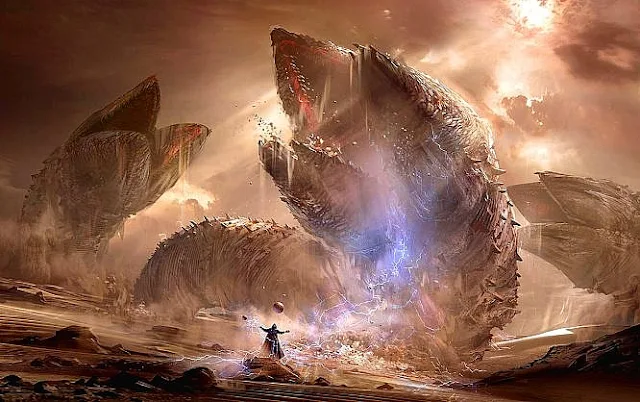If I have seen further than others, it is by standing on the shoulders of giants - Newton
Talking up the Dune mantle seems an unlikely challenge for the son of Frank Herbert but a challenge accepted nonetheless.
Brian Herbet and his collaborator Kevin J Anderson have vastly enriched the universe of Dune with a large bibliography of work.
If they have seen further into the realm of Dune, it was because of the hefty shoulders of Frank.
Brian Herbert and Kevin J. Anderson are two American science fiction writers who are known for extending the Dune universe, which was originally created by Brian's father, Frank Herbert.
After Frank Herbert passed away in 1986, Brian became the literary executor of his father's estate and worked to preserve and promote his father's legacy.
In the late 1990s, Brian Herbert decided to write a series of prequel novels to his father's original Dune series. He approached Kevin J. Anderson, a well-known science fiction writer, to collaborate with him on the project.
Anderson had already established himself as a successful author, with numerous best-selling novels and a reputation for being able to write in a variety of different science fiction sub-genres. He was also a fan of the Dune series and had already written a Dune novella, "The Road to Dune," which was published in 1985.
Brian and Kevin worked closely together on the "Prelude to Dune" series, with Brian providing the overall vision and outline of the story, while Kevin handled the actual writing. The two writers worked collaboratively to ensure that the novels were true to Frank Herbert's original vision while also introducing new characters and storylines that would expand the Dune universe.
Setting up for the success of Prelude to Dune
The series is set in the years leading up to the events of Frank Herbert's original "Dune" series and explores the history and politics of the major houses of the Imperium
Their first book, "Dune: House Atreides," was published in 1999, and it was followed by two more prequel novels, "Dune: House Harkonnen" and "Dune: House Corrino."
One of the main themes of the "Prelude to Dune" series is the idea of power and its corrupting influence. The novels show how the major houses of the Imperium are willing to do whatever it takes to gain power and maintain their status, including betraying and manipulating each other. The series also explores the idea of destiny, as many of the characters believe that their actions are preordained and that they are merely playing out roles that have been assigned to them by fate.
Another major theme of the series is the conflict between human and machine. The novels show how the development of advanced technology has led to the rise of thinking machines, which are eventually outlawed by the Imperium after a long and bloody war known as the Butlerian Jihad.
The series also explores the tension between tradition and progress, as some characters seek to embrace new technologies while others cling to the old ways.
"My father created the Dune universe, and it was his hope that it would be carried on after he died. I've been working hard to do that, and I'm proud of what we've accomplished."
In 2002, Herbert and Anderson published "Hunters of Dune," which was the first of a two-part series that continued the original Dune series following Dune: Chapterhouse. The second book, "Sandworms of Dune," was published in 2007, and it concluded the story that Frank Herbert had left unfinished at the time of his death.
Overall, Herbert and Anderson's work has been successful and well-received by both fans and critics of the Dune series. Their novels have been New York Times bestsellers, and they have won several awards for their work, including the Hugo Award for Best Novel for "Dune: The Butlerian Jihad" in 2003.
However, their work has also been criticized by some fans of the original series, who feel that the new books lack the complexity and depth of Frank Herbert's work. Some fans also feel that Brian Herbert and Kevin J. Anderson have taken too many liberties with Frank Herbert's original vision, and that their novels sometimes contradict the events and themes of the original series.
Continuing the legacy of Herbert's original story
In 2002, Herbert and Anderson published "Hunters of Dune," which was the first of a two-part series that continued the original Dune series following Dune: Chapterhouse. The second book, "Sandworms of Dune," was published in 2007, and it concluded the story that Frank Herbert had left unfinished at the time of his death.
Overall, Herbert and Anderson's work has been successful and well-received by both fans and critics of the Dune series. Their novels have been New York Times bestsellers, and they have won several awards for their work, including the Hugo Award for Best Novel for "Dune: The Butlerian Jihad" in 2003.
However, their work has also been criticized by some fans of the original series, who feel that the new books lack the complexity and depth of Frank Herbert's work. Some fans also feel that Brian Herbert and Kevin J. Anderson have taken too many liberties with Frank Herbert's original vision, and that their novels sometimes contradict the events and themes of the original series.
















